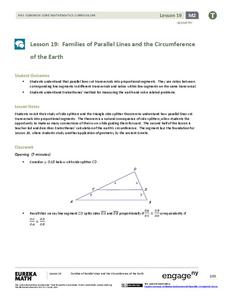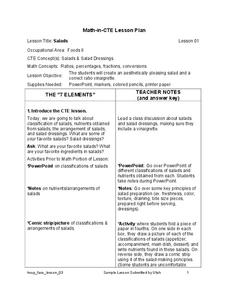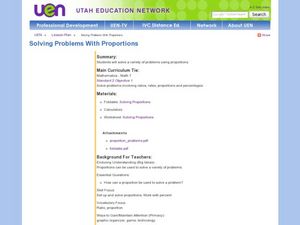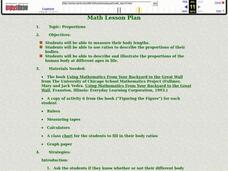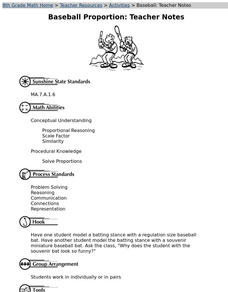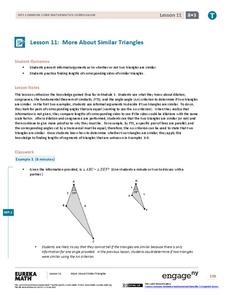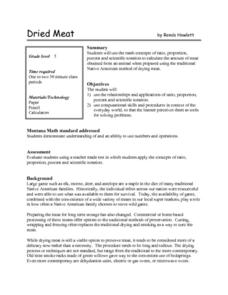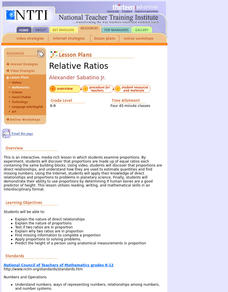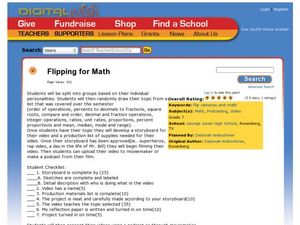Bowland
AstroZoo
Rescue animals in the zoo by applying math concepts. Groups of learners solve three missions involving oxygen, food, and climate control. Each group selects an animal from one of four bio-domes.
Curated OER
Applications Involving Quadratic Equations
In this algebra worksheet, students solve 6 word problems. Problems include the necessary equations. Students solve 5 formulas by isolating the indicated variable.
EngageNY
Families of Parallel Lines and the Circumference of the Earth
How do you fit a tape measure around the Earth? No need if you know a little geometry! Pupils begin by extending their understanding of the Side Splitter Theorem to a transversal cut by parallel lines. Once they identify the...
EduGAINs
Making Savvy Consumer Choices
It's never too early to learn about grocery budgeting. Middle schoolers delve into the world of consumer math with a lesson plan that focuses on both healthy choices and real-world math applications. Groups work together to form a...
National Research Center for Career and Technical Education
Salads
Lettuce talk for a moment about your culinary scholars; do they have what it takes to create a great salad? Show them the finer points of salad preparation with a career and technology lesson that combines direct instruction, creativity,...
Curated OER
Count The Letters
Young scholars perform activities involving ratios, proportions and percents. Given a newspaper article, groups of students count the number of letters in a given area. They use calculators and data collected to construct a pie chart...
Curated OER
Solving Problems with Proportions
Seventh graders explore the concept of proportions. In this proportion lesson, 7th graders play a review game involving whiteboards. Students work in groups to solve a given proportion the fastest. Students also work in pairs to solve...
Curated OER
Ratio, Percent, & Proportions
Seventh graders explore the concept of percents, ratios, and proportions. In this percents, ratios, and proportion lesson, 7th graders have 237 ounces of beads to weigh. Students work in groups to weigh the beads in a way so that each...
Curated OER
Proportions
Young scholars study proportions. In this mathematics lesson, students measure their body length, head length, and ratio of their body, write their findings on a group chart, and discuss how a person's head size or arm span are in...
Curated OER
Baseball Proportion
Eighth graders measure regular baseball bats and souvenir bats in centimeters. They determine how tall a person would be to be in proportion to the souvenir bat, create a poster depicting the person, and explain the proportional...
Curated OER
Ratios, Rates, Percent and Nutrition
Examine food labels to determine percentage of fat and sugar to total calories with middle schoolers. Daily nutritional guidelines are discussed and learners will decide how well their foods fit into a healthy diet. In the provided...
EngageNY
More About Similar Triangles
Determine whether two triangles are similar. The lesson presents opportunities for pupils to find the criterion needed to show that two triangles are similar. Scholars use the definition of similarity to find any missing side...
Curated OER
Using Proportions to Estimate
Students calculate ratio and proportion. In this unit rates instructional activity, students estimate using proportions and find their errors in doing so. They calculate unit rates and define the concept of unit rates.
Curated OER
Indirect Measurement with Similar Triangles
Students use similar triangles to find missing heights. In this using similar triangles to find missing heights instructional activity, students use proportions to find the heights of missing side lengths. Students find the...
Curated OER
Dried Meat
Learners investigate the traditional method of drying meat used by Native Americans. They apply math concepts such as ratio, proportion, percent, and scientific notation to determine the amount of meat the is dried from an animal using...
Curated OER
Proportional Problems 1
Eighth graders explore representing fractions as ratios and proportions. They model proportions through the use of blocks, LEGO gears and activities with bicycle gears and pedals. Students work with bicycle gear boxes to observe and...
Curated OER
A Matter of Proportion
Students measure the relative heights of the mosaic giraffe and its trainer and compare their proportions to an actual giraffe and zoo trainer.
Curated OER
Ratios
Sixth graders investigate the concept of ratios and how they can be used to represent the comparison of quantities. The lesson is taught using a table or graph to compare two categories of data.
National Research Center for Career and Technical Education
Back to Basics
Your class will enjoy this Health Science lesson created by CTE and math teachers from Missouri. Learners make conversions between the apothecary system and metric and US standard measurements used in the healthcare field. The CTE...
Curated OER
Candy Machine
Using the concept of a candy vending machine, young mathematicians explore the sugar ratios found in different types of candy. Using the provided information, class members calculate and compare different ratios in...
Curated OER
Relative Ratios
Students discover that proportions are made up of equal ratios each containing the same building blocks. They, using the Internet, apply their knowledge of direct relationships and proportions to problems in planetary science.
Curated OER
Quilting with Middle School Students: Using Proportionality to Develop Quilt Designs
Learners use quilt patterns to illustrate ratios. In this fractions lesson, students color quilt patterns using given fractions and ratios of colors. A finished "quilt" is assembled from the work of the learners. This is an...
Curated OER
Flipping For Math
Seventh graders create a video of different formats to deliver a presentation of a math concept such as square roots, decimals, fractions, and more. In this math presentation lesson plan, 7th graders can plan a rap video, story,...
Curated OER
Art Class, Variation 2
Given a set of six paint mix ratios, artistic mathematicians produce an equation that relates the number of parts for blue paint to parts for yellow paint resulting new shades of green.


